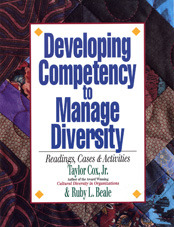Developing Competency to Manage Diversity
Taylor Cox (Author) | Ruby Beale (Author)
Publication date: 04/01/1997
Recognizing that "managing" diversity has become a critical skill in organizations all over the world, Developing Competency to Manage Diversity shows how the dynamics of diversity affect people on all levels of society and in all kinds of organizations-from individual relationships to community interactions, from city and national governments to work teams and product markets.
Defining diversity as "a mix of people in one social system who have distinctly different, socially relevant, group identities," this volume responds to the increasing need to function effectively in workplace contexts that are culturally, socially, economically, and racially diverse. To this end, it provides managers with tools they need to successfully manage a diverse workforce. Chapters provide specific tasks and activities to:
o Increase awareness of coworkers' cultural backgrounds
o Create a "pro-diversity" organizational climate
o Develop an operational definition of diversity
o Explore how group identity applies to each group member
o Investigate differences of cognitive style
o Customize team-building strategies for diverse groups
Organized in an easy-to-follow, step-by-step format, a set of twenty-three readings, six case studies, and thirty-one activities takes readers through a three-stage learning process. The first stage creates awareness of a diversity-related issue, the second stage develops knowledge and understanding of effective ways to handle that issue, and the final stage outlines practical actions to respond to the issue. The high costs of failing to recognize and manage diversity-absenteeism, dissatisfaction, barriers to contribution, harassment, discrimination suits, reduced efficiency, and lack of communication-as well as the potential to leverage diversity as an organizational resource-should motivate organizations and groups to make full use of Developing Competency to Manage Diversity.
- Provides a comprehensive picture of participation as the system of governance we need to meet the workplace challenges of today, and tomorrow
- Describes what executives, managers, workers, labor unions, customers, and suppliers can do as part of a participative enterprise
- Argues that participative governance is a major issue of our times, affecting all areas of our lives: education, business, government, families, and community organizations
Find out more about our Bulk Buyer Program
- 10-49: 20% discount
- 50-99: 35% discount
- 100-999: 38% discount
- 1000-1999: 40% discount
- 2000+ Contact ( bookorders@bkpub.com )
Recognizing that "managing" diversity has become a critical skill in organizations all over the world, Developing Competency to Manage Diversity shows how the dynamics of diversity affect people on all levels of society and in all kinds of organizations-from individual relationships to community interactions, from city and national governments to work teams and product markets.
Defining diversity as "a mix of people in one social system who have distinctly different, socially relevant, group identities," this volume responds to the increasing need to function effectively in workplace contexts that are culturally, socially, economically, and racially diverse. To this end, it provides managers with tools they need to successfully manage a diverse workforce. Chapters provide specific tasks and activities to:
o Increase awareness of coworkers' cultural backgrounds
o Create a "pro-diversity" organizational climate
o Develop an operational definition of diversity
o Explore how group identity applies to each group member
o Investigate differences of cognitive style
o Customize team-building strategies for diverse groups
Organized in an easy-to-follow, step-by-step format, a set of twenty-three readings, six case studies, and thirty-one activities takes readers through a three-stage learning process. The first stage creates awareness of a diversity-related issue, the second stage develops knowledge and understanding of effective ways to handle that issue, and the final stage outlines practical actions to respond to the issue. The high costs of failing to recognize and manage diversity-absenteeism, dissatisfaction, barriers to contribution, harassment, discrimination suits, reduced efficiency, and lack of communication-as well as the potential to leverage diversity as an organizational resource-should motivate organizations and groups to make full use of Developing Competency to Manage Diversity.
- Provides a comprehensive picture of participation as the system of governance we need to meet the workplace challenges of today, and tomorrow
- Describes what executives, managers, workers, labor unions, customers, and suppliers can do as part of a participative enterprise
- Argues that participative governance is a major issue of our times, affecting all areas of our lives: education, business, government, families, and community organizations









